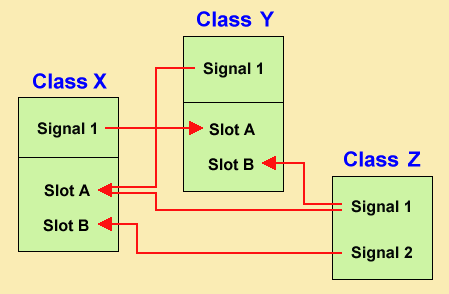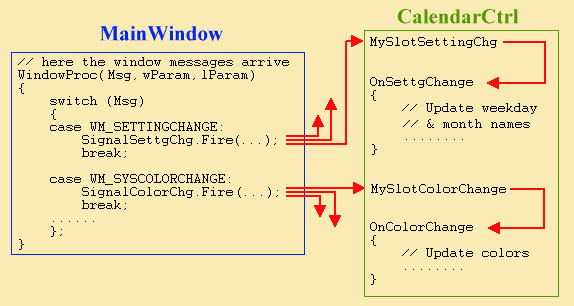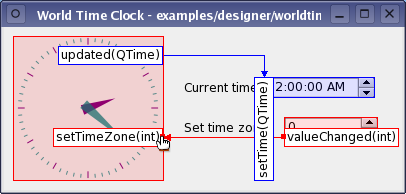Qt Signal Slot Template Class Average ratng: 3,6/5 3959 reviews
- Qt Signal Slot Template Classes
- Qt Signal Slot Template Classification
- Qt Signal Slot Template Classic
- Qt Signal Slot Template Classifieds

- Old syntax Qt 5 continues to support the old string-based syntax for connecting signals and slots defined in a QObject or any class that inherits from QObject (including QWidget) connect (sender, SIGNAL (valueChanged (QString, QString)), receiver, SLOT (updateValue (QString))); New: connecting to QObject member.
- Signals and slots are loosely coupled: A class which emits a signal neither knows nor cares which slots receive the signal. Qt's signals and slots mechanism ensures that if you connect a signal to a slot, the slot will be called with the signal's parameters at the right time. Signals and slots can take any number of arguments of any type.
I’ve been asked multiple times how I would implement a signal / slot mechanism in modern C++. Here is the answer!
What’s the Signal / Slot Pattern?
[...] a language construct [...] which makes it easy to implement the Observer pattern while avoiding boilerplate code. The concept is that GUI widgets can send signals containing event information which can be received by other controls using special functions known as slots. - Wikipedia
The receivers of signals are called Slots in Qt terminology. A number of standard slots are provided on Qt classes to allow you to wire together different parts of your application. However, you can also use any Python function as a slot, and therefore receive the message yourself. A QObject only holds data and logic you can use in QML as properties, signals and slots. When registering a QObject class as a type for QML, keep this restriction in mind. To create a QML Item with C which should support a visual representation with all default properties, derive from QQuickItem instead.
So basically it allows for event based inter-object communication. In my opinion it’s intuitive to use and produces easily readable code when used in a moderate amount. And the big plus: It can be added to your program with one simple template class!
There are many libraries around (refer to the linked Wikipedia article) implementing this pattern, but it’s so easy to implement on you own that I would recommend to do this without an additional dependency. All you need is the header I posted below. And it’s a good exercise.
The signal template class
Below you can find the entire class. Because this class is using variadic templates you can define signals which pass any kind of data to their slots. Basically you can create signals which allow for arbitrary slot signatures. The emit method will accept the same argument types you declared as template parameters for the Signal class. The class is documented with comments and should be quite understandable. Further below you will find two usage examples.
Simple usage
The example below creates a simple signal. To this signal functions may be connected which accept a string and an integer. A lambda is connected and gets called when the emit method of the signal is called.
When you saved the Signal class as Signal.hpp and the above example as main.cpp you can compile the example with:
And if you execute the resulting application you will get the following output:
Advanced usage
This example shows the usage with classes. A message gets displayed when the button is clicked. Note that neither the button knows anything of a message nor does the message know anything about a button. That’s awesome! You can compile this example in the same way as the first.
You may also connect member functions which take arguments (Thank you FlashingChris for pointing out how to do this without std::placeholders!). In the following example Alice and Bob may say something and the other will hear it:
Issues & next steps
There are two drawbacks in this simple implementation: It’s not threadsafe and you cannot disconnect a slot from a signal from within the slot callback. Both problems are easy to solve but would make this example more complex.
Using this Signal class other patterns can be implemented easily. In a follow-up post I’ll present another simple class: the Property. This will allow for a clean implementation of the observer pattern.
Have some fun coding events in C++!
Edit on 2020-10-19:
- Add move-copy-constructor and move-assignment-operator
- Add
emit_for_all_but_one and emit_for methods. - Remove previously added
std::forward.
Please enable JavaScript to view the comments powered by Disqus.blog comments powered by
 Disqus
DisqusManage connections between VTK events and Qt slots. More...
#include <vtkEventQtSlotConnect.h>
[legend]Collaboration diagram for vtkEventQtSlotConnect:
 [legend]
[legend]Public Types |
| typedef vtkObject | Superclass |
Public Member Functions |
| virtual vtkTypeBool | IsA (const char *type) |
Return 1 if this class is the same type of (or a subclass of) the named class. More...
|
| vtkEventQtSlotConnect * | NewInstance () const |
| void | PrintSelf (ostream &os, vtkIndent indent) override |
Print the current connections between VTK and Qt. More...
|
| virtual void | Connect (vtkObject *vtk_obj, unsigned long event, const QObject *qt_obj, const char *slot, void *client_data=nullptr, float priority=0.0, Qt::ConnectionType type=Qt::AutoConnection) |
Connect a vtk object's event with a Qt object's slot. More...
|
| virtual void | Disconnect (vtkObject *vtk_obj=nullptr, unsigned long event=vtkCommand::NoEvent, const QObject *qt_obj=nullptr, const char *slot=nullptr, void *client_data=nullptr) |
Disconnect a vtk object from a qt object. More...
|
| virtual int | GetNumberOfConnections () const |
Allow to query vtkEventQtSlotConnect to know if some Connect() have been setup and how many. More...
|
| Public Member Functions inherited from vtkObject |
| vtkBaseTypeMacro (vtkObject, vtkObjectBase) |
| virtual void | DebugOn () |
Turn debugging output on. More...
|
| virtual void | DebugOff () |
Turn debugging output off. More...
|
| bool | GetDebug () |
Get the value of the debug flag. More...
|
| void | SetDebug (bool debugFlag) |
Set the value of the debug flag. More...
|
| virtual void | Modified () |
Update the modification time for this object. More...
|
| virtual vtkMTimeType | GetMTime () |
Return this object's modified time. More...
|
| unsigned long | AddObserver (unsigned long event, vtkCommand *, float priority=0.0f) |
Allow people to add/remove/invoke observers (callbacks) to any VTK object. More...
|
| unsigned long | AddObserver (const char *event, vtkCommand *, float priority=0.0f) |
| vtkCommand * | GetCommand (unsigned long tag) |
| void | RemoveObserver (vtkCommand *) |
| void | RemoveObservers (unsigned long event, vtkCommand *) |
| void | RemoveObservers (const char *event, vtkCommand *) |
| vtkTypeBool | HasObserver (unsigned long event, vtkCommand *) |
| vtkTypeBool | HasObserver (const char *event, vtkCommand *) |
| void | RemoveObserver (unsigned long tag) |
| void | RemoveObservers (unsigned long event) |
| void | RemoveObservers (const char *event) |
| void | RemoveAllObservers () |
| vtkTypeBool | HasObserver (unsigned long event) |
| vtkTypeBool | HasObserver (const char *event) |
| template<class U , class T > |
| unsigned long | AddObserver (unsigned long event, U observer, void(T::*callback)(), float priority=0.0f) |
Overloads to AddObserver that allow developers to add class member functions as callbacks for events. More...
|
| template<class U , class T > |
| unsigned long | AddObserver (unsigned long event, U observer, void(T::*callback)(vtkObject *, unsigned long, void *), float priority=0.0f) |
| template<class U , class T > |
| unsigned long | AddObserver (unsigned long event, U observer, bool(T::*callback)(vtkObject *, unsigned long, void *), float priority=0.0f) |
Allow user to set the AbortFlagOn() with the return value of the callback method. More...
|
| int | InvokeEvent (unsigned long event, void *callData) |
This method invokes an event and return whether the event was aborted or not. More...
|
| int | InvokeEvent (const char *event, void *callData) |
| int | InvokeEvent (unsigned long event) |
| int | InvokeEvent (const char *event) |
| Public Member Functions inherited from vtkObjectBase |
| const char * | GetClassName () const |
Return the class name as a string. More...
|
| virtual vtkIdType | GetNumberOfGenerationsFromBase (const char *name) |
Given the name of a base class of this class type, return the distance of inheritance between this class type and the named class (how many generations of inheritance are there between this class and the named class). More...
|
| virtual void | Delete () |
Delete a VTK object. More...
|
| virtual void | FastDelete () |
Delete a reference to this object. More...
|
| void | InitializeObjectBase () |
| void | Print (ostream &os) |
Print an object to an ostream. More...
|
| virtual void | PrintHeader (ostream &os, vtkIndent indent) |
| virtual void | PrintTrailer (ostream &os, vtkIndent indent) |
| virtual void | Register (vtkObjectBase *o) |
Increase the reference count (mark as used by another object). More...
|
| virtual void | UnRegister (vtkObjectBase *o) |
Decrease the reference count (release by another object). More...
|
| int | GetReferenceCount () |
Return the current reference count of this object. More...
|
| void | SetReferenceCount (int) |
Sets the reference count. More...
|
| bool | GetIsInMemkind () const |
A local state flag that remembers whether this object lives in the normal or extended memory space. More...
|
Static Public Member Functions |
| static vtkEventQtSlotConnect * | New () |
| static vtkTypeBool | IsTypeOf (const char *type) |
| static vtkEventQtSlotConnect * | SafeDownCast (vtkObjectBase *o) |
| Static Public Member Functions inherited from vtkObject |
| static vtkObject * | New () |
Create an object with Debug turned off, modified time initialized to zero, and reference counting on. More...
|
| static void | BreakOnError () |
This method is called when vtkErrorMacro executes. More...
|
| static void | SetGlobalWarningDisplay (int val) |
This is a global flag that controls whether any debug, warning or error messages are displayed. More...
|
| static void | GlobalWarningDisplayOn () |
| static void | GlobalWarningDisplayOff () |
| static int | GetGlobalWarningDisplay () |
| Static Public Member Functions inherited from vtkObjectBase |
| static vtkTypeBool | IsTypeOf (const char *name) |
Return 1 if this class type is the same type of (or a subclass of) the named class. More...
|
| static vtkIdType | GetNumberOfGenerationsFromBaseType (const char *name) |
Given a the name of a base class of this class type, return the distance of inheritance between this class type and the named class (how many generations of inheritance are there between this class and the named class). More...
|
| static vtkObjectBase * | New () |
Create an object with Debug turned off, modified time initialized to zero, and reference counting on. More...
|
| static void | SetMemkindDirectory (const char *directoryname) |
The name of a directory, ideally mounted -o dax, to memory map an extended memory space within. More...
|
| static bool | GetUsingMemkind () |
A global state flag that controls whether vtkObjects are constructed in the usual way (the default) or within the extended memory space. More...
|
Protected Member Functions |
| virtual vtkObjectBase * | NewInstanceInternal () const |
| void | RemoveConnection (vtkQtConnection *) |
| vtkEventQtSlotConnect () |
| ~vtkEventQtSlotConnect () override |
| Protected Member Functions inherited from vtkObject |
| vtkObject () |
| ~vtkObject () override |
| void | RegisterInternal (vtkObjectBase *, vtkTypeBool check) override |
| void | UnRegisterInternal (vtkObjectBase *, vtkTypeBool check) override |
| void | InternalGrabFocus (vtkCommand *mouseEvents, vtkCommand *keypressEvents=nullptr) |
These methods allow a command to exclusively grab all events. More...
|
| void | InternalReleaseFocus () |
| Protected Member Functions inherited from vtkObjectBase |
| vtkObjectBase () |
| virtual | ~vtkObjectBase () |
| virtual void | ReportReferences (vtkGarbageCollector *) |
| vtkObjectBase (const vtkObjectBase &) |
| void | operator= (const vtkObjectBase &) |
Protected Attributes |
| vtkQtConnections * | Connections |
| Protected Attributes inherited from vtkObject |
| bool | Debug |
| vtkTimeStamp | MTime |
| vtkSubjectHelper * | SubjectHelper |
| Protected Attributes inherited from vtkObjectBase |
| std::atomic< int32_t > | ReferenceCount |
| vtkWeakPointerBase ** | WeakPointers |
Friends |
| class | vtkQtConnection |
Additional Inherited Members |
| Static Protected Member Functions inherited from vtkObjectBase |
| static vtkMallocingFunction | GetCurrentMallocFunction () |
| static vtkReallocingFunction | GetCurrentReallocFunction () |
| static vtkFreeingFunction | GetCurrentFreeFunction () |
| static vtkFreeingFunction | GetAlternateFreeFunction () |
Detailed Description
Manage connections between VTK events and Qt slots.
vtkEventQtSlotConnect provides a way to manage connections between VTK events and Qt slots. Qt slots to connect with must have one of the following signatures:
- MySlot()
- MySlot(vtkObject* caller)
- MySlot(vtkObject* caller, unsigned long vtk_event)
- MySlot(vtkObject* caller, unsigned long vtk_event, void* client_data)
- MySlot(vtkObject* caller, unsigned long vtk_event, void* client_data, void* call_data)
- MySlot(vtkObject* caller, unsigned long vtk_event, void* client_data, void* call_data, vtkCommand*)
Definition at line 57 of file vtkEventQtSlotConnect.h.
Member Typedef Documentation
◆ Superclass
| typedef vtkObjectvtkEventQtSlotConnect::Superclass |
Definition at line 61 of file vtkEventQtSlotConnect.h.
Constructor & Destructor Documentation
◆ vtkEventQtSlotConnect()
| vtkEventQtSlotConnect::vtkEventQtSlotConnect | ( | ) |
| protected |
◆ ~vtkEventQtSlotConnect()
| vtkEventQtSlotConnect::~vtkEventQtSlotConnect | ( | ) |
| overrideprotected |
Member Function Documentation
◆ New()

| static vtkEventQtSlotConnect* vtkEventQtSlotConnect::New | ( | ) |
| static |
◆ IsTypeOf()
| static vtkTypeBool vtkEventQtSlotConnect::IsTypeOf | ( | const char * | type | ) |
| static |
◆ IsA()
| virtual vtkTypeBool vtkEventQtSlotConnect::IsA | ( | const char * | name | ) |
| virtual |
Return 1 if this class is the same type of (or a subclass of) the named class.
Returns 0 otherwise. This method works in combination with vtkTypeMacro found in vtkSetGet.h.
Reimplemented from vtkObjectBase.
◆ SafeDownCast()
| static vtkEventQtSlotConnect* vtkEventQtSlotConnect::SafeDownCast | ( | vtkObjectBase * | o | ) |
| static |
◆ NewInstanceInternal()
| virtual vtkObjectBase* vtkEventQtSlotConnect::NewInstanceInternal | ( | ) | const |
| protectedvirtual |
◆ NewInstance()
| vtkEventQtSlotConnect* vtkEventQtSlotConnect::NewInstance | ( | ) | const |
◆ PrintSelf()
| void vtkEventQtSlotConnect::PrintSelf | ( | ostream & | os, | | vtkIndent | indent | | ) |
| overridevirtual |
Print the current connections between VTK and Qt.
Reimplemented from vtkObject.
◆ Connect()
| virtual void vtkEventQtSlotConnect::Connect | ( | vtkObject * | vtk_obj, | | unsigned long | event, | | const QObject * | qt_obj, | | const char * | slot, | | void * | client_data = nullptr, | | float | priority = 0.0, | | Qt::ConnectionType | type = Qt::AutoConnection | | ) |
| virtual |
Connect a vtk object's event with a Qt object's slot.
Qt Signal Slot Template Classes
Multiple connections which are identical are treated as separate connections.
◆ Disconnect()
| virtual void vtkEventQtSlotConnect::Disconnect | ( | vtkObject * | vtk_obj = nullptr, | | unsigned long | event = vtkCommand::NoEvent, | | const QObject * | qt_obj = nullptr, | | const char * | slot = nullptr, | | void * | client_data = nullptr | | ) |
| virtual |
Disconnect a vtk object from a qt object.
Passing no arguments will disconnect all slots maintained by this object. Passing in only a vtk object will disconnect all slots from it. Passing only a vtk object and event, will disconnect all slots matching the vtk object and event. Passing all information in will match all information.
◆ GetNumberOfConnections()
| virtual int vtkEventQtSlotConnect::GetNumberOfConnections | ( | ) | const |
| virtual |
Allow to query vtkEventQtSlotConnect to know if some Connect() have been setup and how many.
◆ RemoveConnection()
| void vtkEventQtSlotConnect::RemoveConnection | ( | vtkQtConnection * | ) |
| protected |
Friends And Related Function Documentation
◆ vtkQtConnection

Definition at line 95 of file vtkEventQtSlotConnect.h.
Member Data Documentation
◆ Connections
Qt Signal Slot Template Classification
| vtkQtConnections* vtkEventQtSlotConnect::Connections |
| protected |
Definition at line 94 of file vtkEventQtSlotConnect.h.
Qt Signal Slot Template Classic
The documentation for this class was generated from the following file:
Qt Signal Slot Template Classifieds
- GUISupport/Qt/vtkEventQtSlotConnect.h

 Disqus
Disqus

